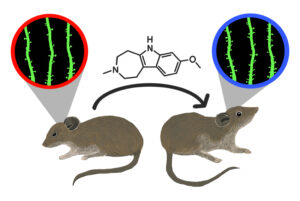A non-hallucinogenic psychedelic analog that has shown promise against addiction and depression may have yet another potential benefit. It may reverse stress-induced harms such as anxiety and disrupted neural activities. This possibility is being explored by scientists based at the University of California (UC), Santa Cruz. They recently reported that an ibogaine-like drug—that is, a drug structurally similar to ibogaine but lacking its toxicity and hallucinogenic effects—rapidly reversed the effects of stress in mice. In fact, the scientists asserted that a single dose of the drug has “rescuing effects.”
Details appeared May 25 in the journal Molecular Psychiatry, in an article titled, “An analog of psychedelics restores functional neural circuits disrupted by unpredictable stress.” The analog, which is called tabernanthalog (TBG), first appeared last year. Back then, it had just been engineered by David E. Olson, PhD, assistant professor of chemistry at the UC Davis. Olson, together with Yi Zuo, PhD, professor of molecular, cell, and developmental biology at UC Santa Cruz, conducted preliminary studies on TBG that appeared in Nature, in an article titled, “A non-hallucinogenic psychedelic analogue with therapeutic potential.”
In the current study, Olson and Zuo collaborated on TBG again. This time, they studied whether TBG could rescue stress-induced affective, sensory, and cognitive deficits. They also evaluated how any such effects could be achieved through the modulation of neural circuits.
“[In] mice exposed to unpredictable mild stress (UMS), administration of a single dose of TBG decreases their anxiety level and rescues deficits in sensory processing as well as in cognitive flexibility,” the authors of the Molecular Psychiatry article wrote. “Post-stress TBG treatment promotes the regrowth of excitatory neuron dendritic spines lost during UMS, decreases the baseline neuronal activity, and enhances whisking-modulation of neuronal activity in the somatosensory cortex.”
On the behavioral level, stress causes increased anxiety, deficits in sensory processing, and reduced flexibility in decision making. In the brain, stress disrupts the connections between neurons and alters the neuronal circuitry, resulting in an imbalance between excitation and inhibition.
“It was very surprising that a single treatment with a low dose had such dramatic effects within a day,” said Zuo, the article’s corresponding author. “I had a hard time believing it even when I saw the initial data.
“Amazingly, TBG reversed all of the effects of stress. This study provides significant insights into neural mechanisms underlying the therapeutic effects of psychedelic analogs on mental illnesses and paves the way for future investigations to understand their cellular and circuit mechanisms.”

In recent years, there has been renewed interest in the use of psychedelic substances for treating illnesses such as addiction, depression, anxiety, and post-traumatic stress disorder. The hallucinogenic effects of these drugs remain a concern, however, and scientists have been unsure whether the hallucinations are therapeutically important or just a side effect.
Ibogaine has shown promise for treating addiction, but it causes dangerous heart arrhythmias in addition to being a powerful hallucinogen. TBG has not yet been tested in humans, but it lacks ibogaine’s toxicity in animal tests, and it doesn’t induce the head-twitch behavior in mice caused by known hallucinogens.
“While TBG does not produce behavioral responses characteristic of serotonergic hallucinogens in rodents (e.g., the head-twitch response), only human clinical studies can ultimately confirm that it is non-hallucinogenic,” the article’s authors noted. “Nevertheless, our work highlights the potential of using analogs of psychedelics to treat stress-related brain disorders.”
TBG promotes rapid spine formation and slightly elevates their rate of survival, leading to more newly formed spines being consolidated into the neuronal network. As such, TBG is representative of a novel class of neuroplasticity-promoting (or psychoplastogenic) compounds that, according to the article’s authors, could be developed into take-home medicines, facilitating patient access. Such compounds, the authors added, would “possess significant advantages over classical psychedelics.”


